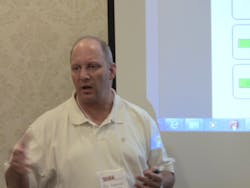Truck frame and Axle Repair Association meets in Baltimore
The Truck frame and Axle Repair Association (TARA) held its spring meeting in Baltimore earlier this week. The focus of the meeting was to help its members run better, more profitable businesses.
held its spring meeting in Baltimore earlier this week. The focus of the meeting was to help its members run better, more profitable businesses.
The featured speaker at the meeting was Mike Anderson of Collision Advice (www.collisionadvice.com), an automotive consulting company.
In a very hands-on, day-long workshop, Anderson, a very successful collision shop owner, offered advice and suggestions on a wide range of business topics. Among them:
- How to design an effective website and how to keep the site at the top of search engines.
- How to create and run a good marketing plan.
- The importance of mass e-mail marketing.
- How to capitalize on a business' moments of truth - those first impressions that a potential client has of a business.
- How to do "corporate espionage" to uncover the strengths and weaknesses of a business’ competitors.
- Ways to use QR Codes (Quick Response Codes) to drive business awareness and sales.
- The benefits to having good profit and loss statements.
Operating procedures
Throughout his presentation, Anderson stressed the importance of having standard operating procedures for everything. These enable a business to ensure consistency in its work and helps it to be system dependent, not people dependent.
Another key element for success is to create an "ideal state" for all shop processes and procedures. The idea here, he said, is to get everything in order and ready prior to the start of every job so that each job can be processed faster.
The result: increased shop efficiency and throughput.
Workers need to have clear expectations so they can understand why something is to be done a certain way, he pointed out.
Moreover, Anderson said all information needs to be tracked and measured, “otherwise you can't see how you are doing and what changes need to be made.
"If you think you know, you don't know," he said.
Processes
Anderson stressed the importance of regularly looking for waste in all shops processes. Once found, changes should be made to reduce the waste.
However, in doing so, “attack the process, not the person,” he said.
You have to trust the people that work for you and have faith that they want to do a good job, he said. That being the case, it is a process problem, not a people problem. “Bring people together to solve the process problems.
“It's about a mindset and creating a culture in which everyone contributes to making things more efficient and better.”
Root cause analysis
Root cause analysis is a good tool to use to discover the real reasons of problems, explained Anderson. Basically, this is done by asking “why” several times to drill down to find out what went wrong. With that information, corrections can be made.
For example: Why wasn't the truck repair completed on time? Because a part was not in stock.
Why wasn't the part is stock? Because it was overlooked in the ordering process.
Why was it overlooked in the ordering? The parts order person didn't place the order. The order was placed by an office worker.
Why didn't the regular parts order person place the parts order? Because he was tied up in an off-site meeting.
With the root cause of the problem identified, a correction can be implemented.
Anderson advised not talking about “change,” as most people do not like change. Instead, talk about “improving” things and how that will benefit everyone. “Paint a vision and you get people to buy in.
Technician hiring
When it comes to hiring technicians, Anderson said the common practice is to hire for skill and fire for attitude. He maintained it is much better to hire for attitude, test for aptitude and teach skill sets.
When it comes to technician training, Anderson said there are four steps: develop - how you want something done, train, test and audit.
Building membership
In his report to the meeting, TARA secretary/treasurer Bill Hinchcliffe of Hawk Frame and Axle said the association is working to revamp its website, make the association more valuable to its members and build membership.
He also lead a discussion on the difficulties faced by independent repair shops in being able to get the same service information and tools that the OEMs make available to their dealership service centers.
Photo
Mike Anderson of Collision Advice speaks to the spring meeting of the Truck/Fame Axle Repair Association (TARA).
About the Author

